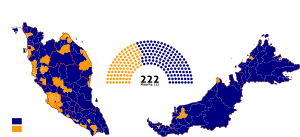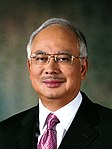
Back Eleccions generals malàisies de 2013 Catalan Parlamentswahl in Malaysia 2013 German Μαλαισιανές γενικές εκλογές 2013 Greek Elecciones federales de Malasia de 2013 Spanish Élections législatives malaisiennes de 2013 French Pemilihan umum Malaysia 2013 ID Elezioni parlamentari in Malaysia del 2013 Italian 2013년 말레이시아 총선거 Korean Pamiliahan umum Malaysia 2013 MIN Pilihan raya umum Malaysia 2013 Malay
| |||||||||||||||||||||||||||||||
All 222 seats in the Dewan Rakyat 112 seats needed for a majority | |||||||||||||||||||||||||||||||
|---|---|---|---|---|---|---|---|---|---|---|---|---|---|---|---|---|---|---|---|---|---|---|---|---|---|---|---|---|---|---|---|
| Registered | 13,268,002 ( | ||||||||||||||||||||||||||||||
| Turnout | 84.60% ( | ||||||||||||||||||||||||||||||
| |||||||||||||||||||||||||||||||
 Results by constituency | |||||||||||||||||||||||||||||||
| |||||||||||||||||||||||||||||||
General elections were held in Malaysia on Sunday, 5 May 2013. Voting took place in all 222 parliamentary constituencies, each electing one MP to the Dewan Rakyat, the dominant house of Parliament. State elections also took place in 505 state constituencies in 12 of the 13 states (excluding Sarawak) on the same day. The elections were the first since Najib Razak became Prime Minister in 2009.
The unofficial opposition Pakatan Rakyat coalition led by Anwar Ibrahim received a majority of the vote, with its three member parties collectively receiving 50.9% of the vote. However, they won only 89 of the 222 seats. The incumbent governing alliance, Barisan Nasional, received 47.4% of the vote and won 133 seats, giving Najib a second term in office. This was at the time the best performance by the opposition against the Barisan Nasional and the first time Barisan Nasional had not received the most votes in a general election.
Because Barisan Nasional had won a majority despite receiving fewer votes than the opposition, the elections were followed by protests and accusations of gerrymandering.[1]
- ^ "What's Malay for gerrymandering?". The Economist. Kuala Lumpur. 9 August 2014. Archived from the original on 23 January 2016. Retrieved 5 January 2016.

